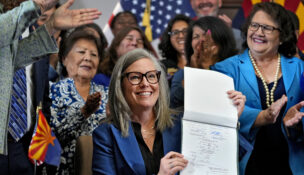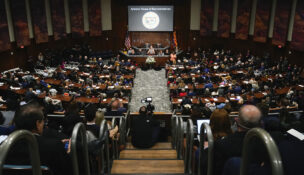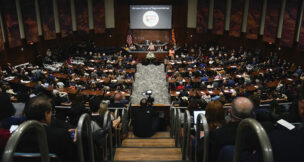From Taylor Swift to Pluto: New laws take effect this Saturday
Howard Fischer, Capitol Media Services//September 12, 2024//
From Taylor Swift to Pluto: New laws take effect this Saturday
Howard Fischer, Capitol Media Services//September 12, 2024//
PHOENIX — You may not notice the effects immediately.
But come this Saturday a host of new laws take effect that cover everything from conception to death.
And they also eventually could play a role in where you live, what food you buy, and even whether you get tickets the next time Taylor Swift is in Arizona.
One of the biggest of the changes will be virtually invisible.
It’s the narrowly approved measure that repeals a territorial-era law that until now made it a crime to terminate a pregnancy except to save the life of the mother. That law has remained on the books, even through the years when the U.S. Supreme Court declared that women have a constitutional right to abortion.
But the reason you may not notice is that state has been operating as if the law already was gone despite the fact that the Arizona Supreme Court ruled earlier this year that the old law was still valid. And that ruling should have taken effect months ago.
Only thing is, Attorney General Kris Mayes convinced the justices to delay the effect of the ruling. The cover story was that they wanted time to study whether to seek U.S. Supreme Court review.
But what that also did is delay the ruling reinstating the old law until Sept. 23. And now, with the legislatively approved repeal becoming law Saturday, there’s nothing left in statute to take effect.
And that leaves a 15-week limit on abortion, one the justices had said did not supersede the old law.
That limit itself could disappear if voters approve Proposition 139. It guarantees the right to terminate a pregnancy without any reason through fetal viability but also allows abortions after that point to protect the life or mental or physical health of the mother.
On the other side of life is a new law about what can happen after you die. Put simply, your relative can become garden mulch.
What’s in the measure allows companies to offer “natural organic reduction” as alternatives to burial or traditional cremation.
Lawmakers have been tinkering with the laws for years.
A recent change allows something called “alkaline hydrolysis.” That’s a variant on cremation, where a body is reduced to “essential elements” using a solution of water, alkaline chemicals, heat, agitation and pressure, all to accelerate the normal decomposition process.”
In both cases, what the family gets back are ashes which can be buried, scattered or kept in a container.
It’s what’s left over that the new law changes.
The process adds things like organic materials such as alfalfa and other items that provide nitrogen and carbon. Then heat and oxygen are added to accelerate the microbial breakdown. And over the course of about 30 days the body is mostly reduced; larger bones, as with cremation, are crushed using a mechanical process and mixed back into the soil.
But here’s the thing: families end up with remains that include not just the weight of the dearly departed but everything else added in. It is up to them whether they have the capacity to deal with a box that can weigh 200 pounds or more.
What may affect many more people are a series of new laws designed to deal with affordable housing. And it starts right in the backyard.
The new law will require cities with at least 75,000 residents to adopt regulations by the end of the year to allow at least “accessory dwelling units,” one attached to the house and one free-standing unit. It also bars communities from adopting restrictions like limiting advertising, requiring the tenants to be relatives and mandating additional parking.
Proponents contend this would create new, and affordable, housing in urban areas. But those arguments ran up against fears that all these “casitas” would simply wind up as Airbnb’s and other vacation rentals and provide no relief to area residents.
Lawmakers did add some language to restrict that – a bit: It says that an owner actually has to reside on the property, a move designed to keep investors from buying up single-family homes to rent out not just the main house but also the casitas.
Another measure, however, has the potential to create a lot more housing units.
This “middle housing” law, which also applies to cities of 75,000 or more, requires that all lots zoned for single-family residential use within a mile of the community’s central business district also allow for duplexes, triplexes, fourplexes and townhomes.
It originally would have required those more dense developments anywhere in the city. But as part of a compromise, these multiplexes can be built outside the central business district only in new developments of 10 acres or more anywhere in the city.
Here, too, while the law is effective Saturday, cities will be given time to actually make the changes.
And a third measure will require cities to allow multifamily residential development or “adaptive reuse” of commercial buildings in up to 10% of total existing commercial, office or mixed-use buildings within the community without additional hurdles like rezoning or a conditional use permit.
As to what to eat, one new law will give you some new options on homemade food.
No, not your home. Someone else’s.
Known informally as the “tamale bill,” the legislation removes some hurdles from the path of those who cook food at home and sell it, whether on the street or for home delivery.
Until now, the list of what home-cooked foods can be sold has been limited largely to things like cakes and cookies. Now the definition of “cottage foods” is expanded to include items that with meat and those that have to be prepared and kept at a certain temperature.
These are things like tamales, menudo and pupusas, items that have been widely available, albeit illegally, in parking lots and in front of food stores.
There are some new requirements, like anyone doing home cooking for retail sales must complete food handler classes and maintain active certification. And there will have to be labels which have not just the ingredients but also the name and registration number of the preparer but also a statement saying, “This product was produced in a home kitchen that may process common food allergens and it snot subject to public health inspection.”
The idea actually was wildly popular among lawmakers when it was first introduced last year, getting the support of 45 of 60 House members and 26 of 30 senators. But then it ran into Gov. Katie Hobbs who said it would “significantly increase the risk of food-borne illness.”
But she drew particular ire over her comment that the law would open the door to items being cooked in home kitchens with “rodent or insect infestation.”
“That is offensive,” said Rep. Alma Herandez, D-Tucson, a supporter of the measure. “And I would be glad to put up my nana’s kitchen or my mom’s kitchen up against anyone else.”
But an override failed when several Democrats who actually supported the original measure voted to leave her veto intact.
Rep. Travis Grantham, R-Gilbert, did make a few tweaks, like putting in some definitions to ensure that it did not create a loophole for large commercial operations in a law meant for literally mom-and-pop operations. That tweak, and the criticism from within her own party, was enough to get her signature.
How quickly you’ll be able to buy a tamale on the street, though, remains unclear.
State health officials said the new law set up a process for people to register. But they can’t say when any permits will actually be available.
Then, after a nice meal, perhaps a concert? Perhaps even the chance of getting tickets the next time Taylor Swift is in town?
One new law could increase the odds of that happening.
It’s all due to Rep. David Cook reacting to the stories last year about Taylor Swift fans in Arizona finding they couldn’t actually buy tickets from the official web site.
That’s because they already had been scooped up by automated software designed to fool the sales site in a way to get around the limit on how much any one individual could buy. And the programs did it so fast that it actually resulted in Ticketmaster shutting down sales – leaving Taylor Swift fans with the only option to buy from secondary sellers who were setting their own inflated prices.
The law crafted by the Globe Republican prohibits anyone from creating or using a bot to purchase tickets in excess of the listed limit for an online sale. It also precludes the use of multiple internet protocol addresses, purchaser accounts or email addresses in a way to get around the limits set on how many tickets any individual could buy.
And the legislation makes it illegal to circumvent or disable any sort of electronic queue, waiting period, presale code or any other sales volume limitation.
It also allows the attorney general to investigate violations and go to court to seek penalties of up to $10,000. And each ticket sold in violation of the law is a separate violation.
Oh, and if you’re searching the skies on the way home, you also could find a piece of Arizona there. As of Saturday, Pluto becomes the “official state planet,” a move engineered to underline the fact that that it was discovered in 1930 at the Lowell Observatory in Flagstaff.
It joins a long list of other items the state has to be declared “official,” ranging from turquoise as the state gemstone and copper as the state metal to the Bola tie as state neckware and the Sonorosauras as the state dinosaur.
But what you’ll be looking at – and, no, you can’t see it with a naked eye – actually isn’t even a planet. It was downgraded years ago by the International Astronomical Union to a “dwarf” planet after scientists concluded it didn’t meet the legal definition.
Rep. Justin Wilmeth, who crafted the new law, said it doesn’t matter to him. He said he wanted to celebrate the legacy of astronomer Clyde Tombaugh.
Other new laws include:
– Making it illegal for rideshare drivers to have a blood-alcohol content of 0.04, half as much as the presumptive legal limit for other private motorists.
– Extending the time political signs can be put up to 71 days prior to an election, up from 45 days.
– Creating a new offense to make it illegal to permit anyone under age 18 to operate or be a passenger in an off-highway vehicle without a helmet. That’s already the case for motorcycles and ATVs, though another new law will allow police to actually issue citations.
– Setting up a procedure to allow property owners to remove “restrictive covenants” from deeds, things like not selling of Jews or Mexicans. They are illegal and unenforceable but some homeowners resent having it in the documents.
– Allowing students at public universities to have an opportunity to select which organizations funded with student fees should not get their cash. This was prompted by some groups, like Students for Justice in Palestine, getting a share of student funds.
– Requires there be at least three class periods on two separate occasions during grades 7 through 12 for Holocaust education and other genocides.
– Barring local ordinances that prohibit owners of single-family detached homes from keeping up to six fowl in the yard. The law does allow cities to require a fenced enclosure a certain distance from other properties. And roosters are not permitted.
– Setting up a system to alert voters if there are changes in their registration like party affiliation, phone number or address.
– Creating a new crime for reporting a serious incident at an educational institution or house of worship knowing it is false and will cause an emergency response.
– Setting up an Arizona-Ireland trade commission.













































